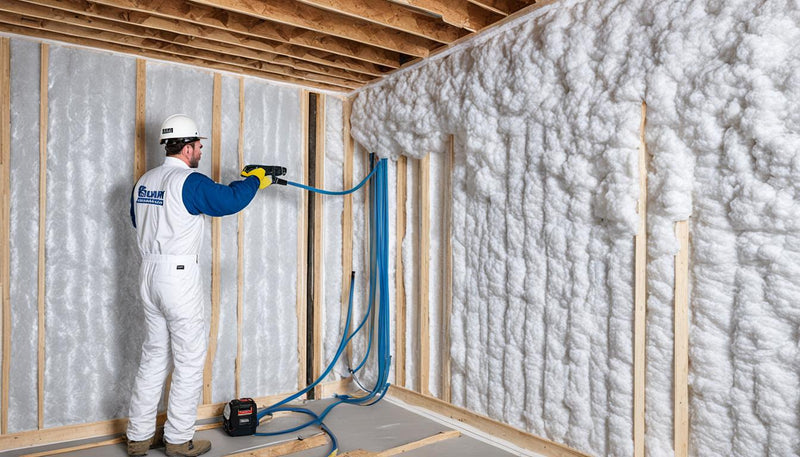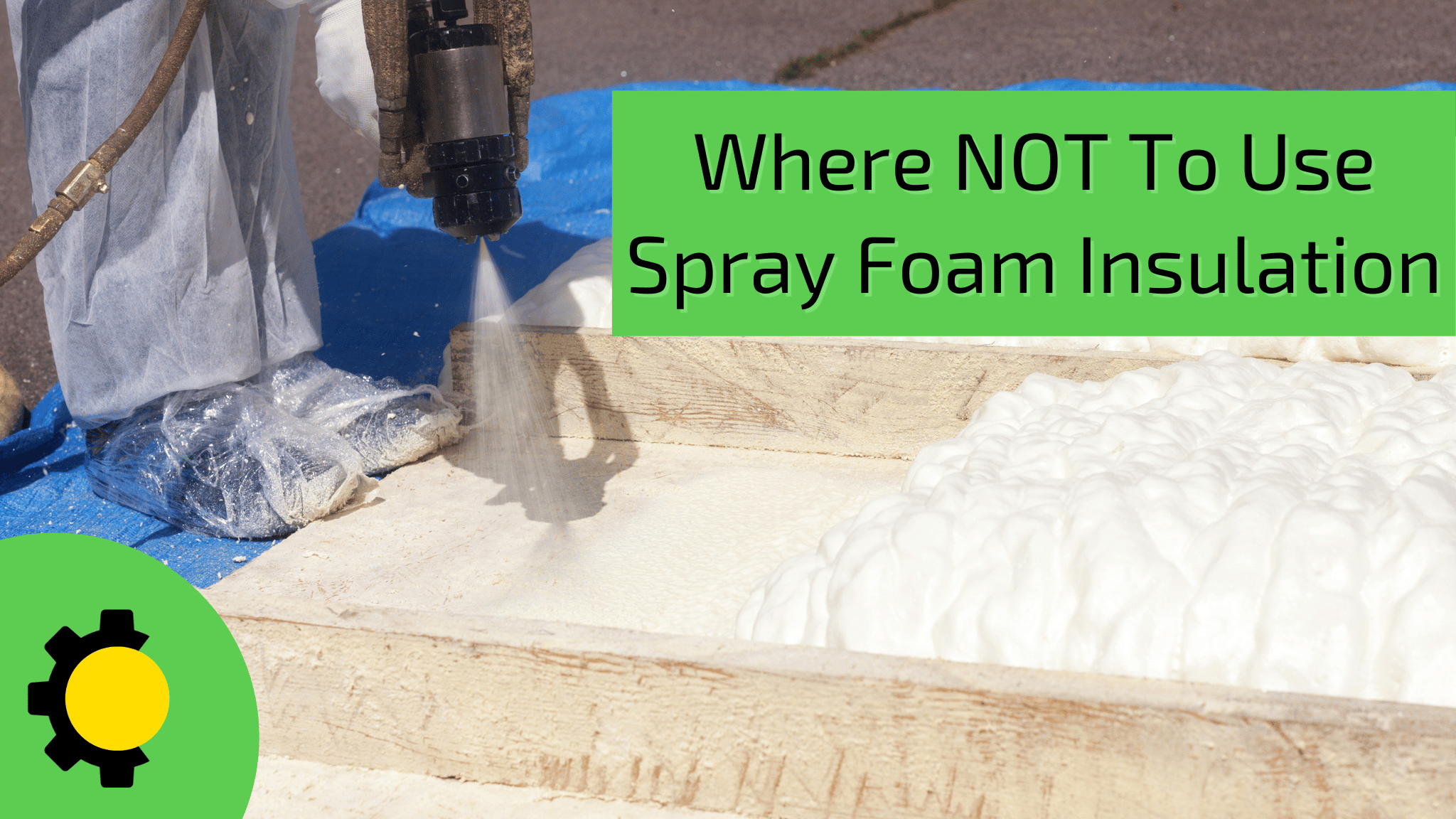Selecting the Right Type of Spray Foam for Your Insulation Requirements
Selecting the Right Type of Spray Foam for Your Insulation Requirements
Blog Article
Spray Foam: The Ultimate Remedy for Air Sealing and Insulation
Spray foam insulation has arised as a leading service for efficient air securing and thermal insulation, offering a distinct mix of properties that set it besides conventional techniques. Its capacity to increase and fill gaps makes it specifically effective in stopping air leak, which can significantly affect energy effectiveness. Comprehending the complete extent of its benefits, setup procedures, and contrasts with other insulation types is crucial for making notified choices. As we check out these aspects, the effects for both brand-new building and constructions and retrofits become increasingly significant. What factors should influence your choice?
What Is Spray Foam?
Spray foam is a functional insulation material that incorporates the principles of air sealing and thermal resistance to improve power performance in structures. Made up primarily of polyurethane or various other comparable compounds, spray foam is applied as a liquid that increases upon call with surface areas, producing a solid, constant layer of insulation. This special property allows it to fill gaps, splits, and voids that typical insulation materials may neglect, offering a remarkable air seal.
There are 2 major kinds of spray foam: open-cell and closed-cell. Open-cell spray foam is lighter and more flexible, providing outstanding audio absorption and a lower R-value per inch - Spray Foam. On the other hand, closed-cell spray foam is denser, offering a greater R-value, moisture resistance, and added architectural stability to constructing parts
The application procedure generally includes specialized tools, making certain a seamless application that follows numerous substratums, consisting of timber, steel, and concrete. This flexibility makes spray foam ideal for both brand-new building and constructions and retrofitting existing frameworks. Its capacity to develop an impermeable obstacle substantially adds to reducing power intake and improving indoor air quality, thereby making it a favored selection among home owners and contractors alike.
Advantages of Spray Foam Insulation
Among the most considerable advantages of spray foam insulation is its extraordinary ability to create a continuous air barrier, which effectively lessens energy loss. Unlike standard insulation materials, spray foam expands to load fractures and gaps, guaranteeing that air leak is significantly lowered. This particular not just boosts power performance but also results in lower utility expenses gradually.
In addition, spray foam insulation offers superior thermal resistance, contributing to an extra stable indoor setting. Its high R-value per inch enables for reliable insulation in restricted rooms, making it suitable for attics, wall surfaces, and crawl spaces. Additionally, the moisture-resistant properties of spray foam help avoid mold and mildew and mold development, advertising much healthier living problems.
One more important advantage of spray foam insulation is its sound-dampening high qualities (Spray Foam). It successfully decreases sound transmission in between rooms, producing a quieter and extra comfy home atmosphere. The toughness of spray foam additionally attracts attention, as it does not sag or resolve gradually, maintaining its efficiency throughout its life expectancy
Exactly How Spray Foam Functions
Understanding just how spray foam insulation works is crucial for valuing its performance in air sealing and thermal resistance. Spray foam insulation includes two key components: isocyanate and polyol resin. When these parts are mixed, they undertake a chemical reaction that causes the material to broaden quickly, developing a dense foam that fills up cavities, gaps, and splits.
As the foam broadens, it sticks to surfaces, creating an impermeable seal that significantly lowers air seepage. This particular makes spray foam insulation very effective at preventing drafts and dampness infiltration, which can result in power loss and damage gradually. Furthermore, the closed-cell variant of spray foam supplies exceptional thermal resistance because of its stiff framework, successfully minimizing heat transfer.
The special residential or commercial properties of spray foam allow it to conform to irregular surface areas, making sure comprehensive insurance coverage and a smooth obstacle. Therefore, spray foam insulation not just enhances energy performance but additionally adds to enhanced interior air quality by reducing the you can try this out accumulation of allergens and pollutants. Inevitably, understanding the technicians behind spray foam highlights its role as a remarkable choice for insulation and air securing in both business and domestic applications.
Installment Refine Overview

Prior to installment, the area needs to be appropriately cleaned and prepped, making certain that surface areas are free from dirt, debris, and dampness. This step is essential because contaminants can compromise bond and overall efficiency. As soon as the area is prepared, the application includes mixing both components of the spray foam, which expands upon contact and loads spaces efficiently.
Trained experts should carry out the setup, making use of customized tools to make sure uniform coverage and optimum density. Safety safety measures, consisting of putting on protective equipment and making certain proper ventilation, are critical during this process. After application, the foam typically treatments swiftly, forming a strong barrier that enhances power efficiency.
Contrasting Spray Foam to Traditional Insulation
When assessing insulation alternatives, spray foam insulation stands out in contrast to traditional products such as fiberglass and cellulose. Unlike fiberglass and cellulose, which can permit air seepage, spray foam increases upon application, filling up voids and gaps to create a closed seal.
Additionally, spray foam offers a higher R-value per inch than standard insulation types, providing even more efficient thermal resistance in a thinner profile. This characteristic is particularly helpful in spaces with minimal tooth cavity depth. YOURURL.com In addition, spray foam is resistant to moisture and mold and mildew development, which can be a significant interest in cellulose and fiberglass, particularly in moist settings.
Nevertheless, spray foam insulation usually carries a higher ahead of time expense than its conventional equivalents. House owners have to evaluate this initial investment versus long-lasting power savings and efficiency advantages. Inevitably, while both insulation kinds serve their purpose, spray foam arises as an advanced service for contemporary insulation needs, specifically in regards to air securing and thermal effectiveness.

Final Thought
In recap, spray foam insulation stands for a very reliable remedy for attaining optimum air sealing and thermal resistance. Its one-of-a-kind homes, including wetness resistance and sound dampening, make it appropriate for different applications in both new buildings and retrofitting jobs (Spray Foam). Although the first costs might be greater compared to traditional insulation materials, the long-lasting advantages, such as substantial power savings and enhanced interior air top quality, justify the investment and underscore its worth in modern building practices.
Spray foam insulation has actually arised as a leading remedy for reliable air securing and thermal insulation, using a distinct mix of residential properties that set it apart from traditional techniques.Spray foam Visit This Link is a versatile insulation product that integrates the concepts of air securing and thermal resistance to boost power effectiveness in structures.When examining insulation choices, spray foam insulation stands out in contrast to conventional products such as fiberglass and cellulose. Inevitably, while both insulation types offer their function, spray foam emerges as a much more advanced option for modern-day insulation needs, particularly in terms of air securing and thermal effectiveness.
In summary, spray foam insulation represents a very efficient solution for accomplishing optimum air securing and thermal resistance.
Report this page